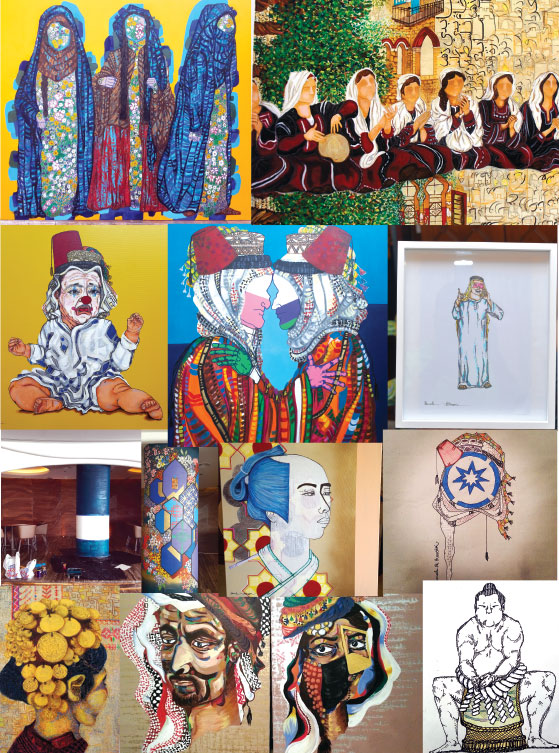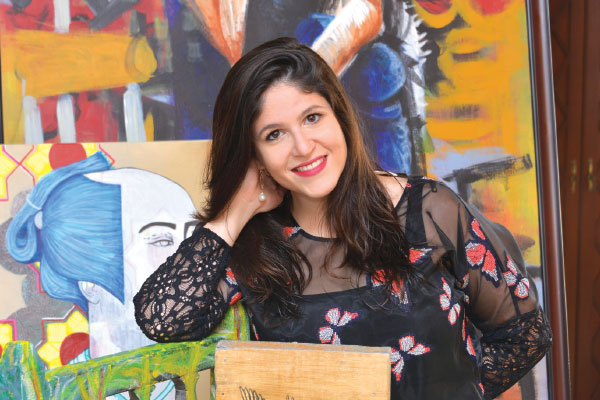This gifted artist spoke to Puja Tiwari about her unique, sentiment-inspired work as well as the growing creative community in Bahrain.
When WTM went to meet artist Ramah Al Husseini, she was busy prepping for an imminent exhibition, with one of her works depicting a caricature of a jolly Saudi man appearing to be chattering on his phone with a floral blindfold on.
“Growing up in Saudi, I saw how widespread it was for women to cover up, mostly to keep men’s thoughts pure.
“This piece challenges that norm in a playful manner and portrays a man being blindfolded for a change, so they don’t have to witness anything to taint their notions,” says Ramah.
As a child, she could be found at the back of the classroom, busy doodling away on anything and everything in front of her. Art has always been her forte, a space in which she could freely express her emotions and escape into a world of endless possibilities.
The Saudi national with Palestinian origins also drew inspiration from her mother, a seasoned painter.
This talent evolved into a passion, and Ramah went on to graduate with a degree in fine arts from the University of Concordia, Canada.
“My work is best described as modern contemporary, with an Arabic influence. It can sometimes be minimalistic, but that depends on my mood and how I feel about the subject matter,” she explains.
Her art truly takes form when she has an emotion attached to it. “I only paint about things I’m really passionate about, and if I have no personal feeling to what I’m painting, the result will usually come out terrible!”
But she adds that emotions can be built from research. A classic example of this is her recent collaboration in an exhibition with a Japanese theme.
“I delved into some information about the culture before beginning the collection, and then painted about elements that I loved and was intrigued by. I melded them with other elements from my own culture and created unique pieces with interesting stories.”
Having found it difficult to work as an artist in Canada, she returned to the region and has since been a part of many exhibitions. She’s been involved with making recycled art for Coca- Cola, with proceeds going to the Dream Society, a charity that makes dreams come true for terminally ill children.
She’s also created T-shirt and bag designs for Super-Hope, which helps children battling diseases such as cancer to develop a positive mental attitude, and has painted shoes for Ayadi relief, a Bahraini youth-led relief organisation.
“I do as much as I can to give back to the community and that is usually with a paintbrush or pencil,” she says.
Asked to choose a favourite among her own works, Ramah’s eyes take on a glimmer as she explains: “One that lies close to my heart is from a solo, Palestinian-themed exhibition titled ‘come and have a taste’, from 2012.
“Originally hailing from Palestine, but never having set foot there, I researched the culture and learned of their folk songs, traditions and dance.”
The image is of a group of women sitting together, central from one end of the canvas to the other, hoping to create a never- ending line, clapping, singing and drumming to traditional folk songs that speak of freedom, peace and hope.
Traditionally inspired shuttered windows run vertically beside a line of olive trees – denoting hope and growth, as well as the possibility of opportunity.
“This painting tugs at my heart strings because it goes to show that even after all the pain and struggle, they still choose to sing together and hope for better,” says Ramah.
She is part of the growing subculture of talented artists gaining momentum in the art scene and says: “A lot of artists and creatives have emerged; now it’s just a matter of time for the general public to take note and begin to truly appreciate art.
“Hopefully they start investing, not just purchasing, and offer more creative jobs while appreciating the effort and flair that is put into each created piece.”
As advice to aspiring artists, Ramah encourages them to never give up, even if people don’t like their work.
“As long as you take yourself seriously and commit to your work and passion, the rest will fall into place. Confidence is the key element,” she says.
Looking to the future, she will be curating a solo exhibition in a few months. She also hopes to do an artist residency anywhere in the world, and is currently trying to build her skills with digital art.

“Basically, I just want to keep doing what I do, what I love, and hope to advance in it,” she says.
You can see some of her work at an upcoming exhibition on August 27 at Malja, or view her Instagram page: @alhusseiniramah


































